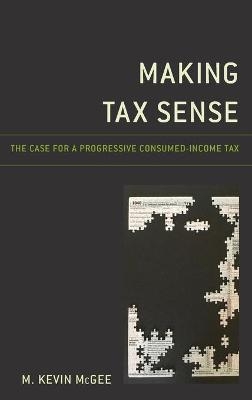
Making Tax Sense
The Case for a Progressive Consumed-Income Tax
Seiten
2019
Lexington Books (Verlag)
978-1-4985-8717-4 (ISBN)
Lexington Books (Verlag)
978-1-4985-8717-4 (ISBN)
This book identifies the changes needed to create a sensible, consistent tax system by converting to a consumed-income tax. These changes would result in a tax system that would be both pro-growth and highly progressive.
Our tax system is a mess. And the reason for that mess is, our tax system is incoherent. A well-designed tax system is like a good jigsaw puzzle: all the pieces fit together snugly, so when the whole thing is fully assembled, it forms a coherent picture. But our current tax system is disjointed, with parts that don't logically fit together. That results in inconsistencies, complexity, loopholes, and distorted incentives.
We need a tax system that make sense. As this book shows however, making a traditional income tax coherent is an impossible goal. But coherence is achievable if we adjust our target, and complete the switch to a consumed-income tax -- a system that taxes all income, not when it is earned, but when that income is consumed. The move towards a consumed-income tax was begun decades ago, when we first adopted IRAs and other tax-deferred savings accounts. We just needed to complete the evolution.
The book explores a variety of tax issues -- among them savings, small businesses, owner-occupied houses, and corporations -- and develops seven groups of recommended changes. These changes would result in a tax system that would be pro-growth, by eliminating the existing disincentives to saving and investment. But the tax system would also remain progressive, with the wealthy taxed as much as and perhaps even more than currently. That combination could make the recommended changes attractive to members of both parties, and might bring to a close the political seesaw in tax policy that we've experienced over that last several decades.
Our tax system is a mess. And the reason for that mess is, our tax system is incoherent. A well-designed tax system is like a good jigsaw puzzle: all the pieces fit together snugly, so when the whole thing is fully assembled, it forms a coherent picture. But our current tax system is disjointed, with parts that don't logically fit together. That results in inconsistencies, complexity, loopholes, and distorted incentives.
We need a tax system that make sense. As this book shows however, making a traditional income tax coherent is an impossible goal. But coherence is achievable if we adjust our target, and complete the switch to a consumed-income tax -- a system that taxes all income, not when it is earned, but when that income is consumed. The move towards a consumed-income tax was begun decades ago, when we first adopted IRAs and other tax-deferred savings accounts. We just needed to complete the evolution.
The book explores a variety of tax issues -- among them savings, small businesses, owner-occupied houses, and corporations -- and develops seven groups of recommended changes. These changes would result in a tax system that would be pro-growth, by eliminating the existing disincentives to saving and investment. But the tax system would also remain progressive, with the wealthy taxed as much as and perhaps even more than currently. That combination could make the recommended changes attractive to members of both parties, and might bring to a close the political seesaw in tax policy that we've experienced over that last several decades.
M. Kevin McGee is professor emeritus of economics at the University of Wisconsin, Oshkosh.
1 The Problem
2 The Impossibility of a Coherent Traditional Income Tax
3 The Logic of Consumption-timed Taxes
4 The VAT, Flat, and all That
5 Savings & Borrowing Under a Consumed-Income Tax
6 The Tax Treatment of Owner Occupied Housing
7 Transition Issues
8 The Tax Treatment of Small Businesses
9 Inheritances, Bequests, and the Estate Tax
10 Insurance
11 The Corporate Income Tax
12 Tax Expenditures
13 The Trump Tax Cut
14 Summary: The Needed Tax Changes
15 Is Reform Attainable?
16 Conclusion
| Erscheinungsdatum | 10.05.2021 |
|---|---|
| Verlagsort | Lanham, MD |
| Sprache | englisch |
| Maße | 161 x 229 mm |
| Gewicht | 449 g |
| Themenwelt | Recht / Steuern ► Steuern / Steuerrecht |
| Sozialwissenschaften ► Politik / Verwaltung ► Staat / Verwaltung | |
| Wirtschaft ► Betriebswirtschaft / Management ► Finanzierung | |
| Wirtschaft ► Volkswirtschaftslehre ► Wirtschaftspolitik | |
| ISBN-10 | 1-4985-8717-8 / 1498587178 |
| ISBN-13 | 978-1-4985-8717-4 / 9781498587174 |
| Zustand | Neuware |
| Informationen gemäß Produktsicherheitsverordnung (GPSR) | |
| Haben Sie eine Frage zum Produkt? |
Mehr entdecken
aus dem Bereich
aus dem Bereich
Organisationen steuern, Strukturen schaffen, Prozesse gestalten
Buch | Softcover (2024)
Rehm Verlag
38,00 €


